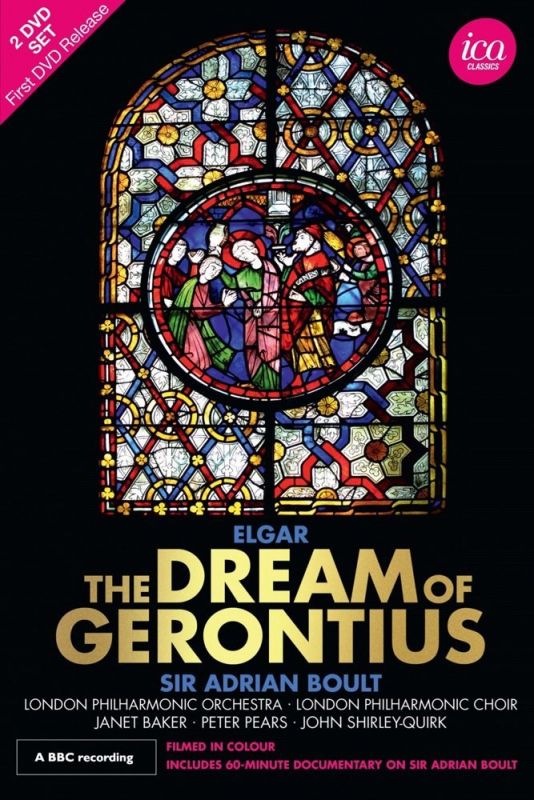ELGAR The Dream of Gerontius
View record and artist detailsRecord and Artist Details
Composer or Director: Edward Elgar
Genre:
Vocal
Label: ICA Classics
Magazine Review Date: 12/2016
Media Format: Digital Versatile Disc
Media Runtime: 100
Mastering:
DDD
Catalogue Number: ICAD5140

Tracks:
| Composition | Artist Credit |
|---|---|
| (The) Dream of Gerontius |
Edward Elgar, Composer
Adrian Boult, Conductor Edward Elgar, Composer Janet Baker, Mezzo soprano John Shirley-Quirk, Bass-baritone London Philharmonic Choir London Philharmonic Orchestra Peter Pears, Tenor |
Author: Edward Seckerson
I take some exception to the opening page or two of the Prelude sounding from under screen captions but it took courage to resist showing any performers at all until almost the very end of the 10-minute Prelude, where the camera pulls back to reveal the patrician figure of Adrian Boult for the first time; and there is a positively daring cut to black-screen in the moments preceding the blinding light which marks the moment Gerontius comes face to face with his maker.
But most effective of all is Large’s decision to have the soloists off-score and performing from memory not behind music stands but against the stonework of the transept; and – bearing in mind that date again, 1968 – we find three great artists at the absolute top of their game. Peter Pears, of course, went on to record the piece with his partner Benjamin Britten but his artistry and great affinity with the ethos of the work was never better demonstrated than it is here. For those who have an issue with the distinctive Pears sound (with all its inherent ‘Englishness’) I can only say that you need to put that aside and focus instead on the sheer intensity and open-heartedness of the singing, the judicious weighting of words and innate sense of the music’s beauty and line. Then there is the ‘illuminated’ quality of his head-voice, so exquisite in the prayerful hushed reprise of ‘Sanctus fortis’, and contrasting so dramatically with the thrillingly full-blooded release of ‘In thine own agony’. He is, in a word, magnificent.
John Shirley-Quirk is marvellous, too, in both his roles, and Janet Baker, inhabiting the Angel as only she could, is in a league of her own. The radiance and amplitude of tone, the transcendent response to words, the key moments of ecstasy like the final ‘Alleluia’ (never better) – you can hear how her performance has marinated in the four years since her famous Barbirolli recording.
That Barbirolli/Hallé account has an immediacy and red-bloodedness that is in some ways the antithesis of Boult’s magisterial approach. Boult is broader and grander in conception, and grows more so here as he takes account of the cathedral acoustic and demonstrably accommodates the echo-delay in his conducting. So much of that (not least in Elgar’s use of the semi-chorus) is written into the piece but here we must deal with an acoustic reality and accept that the snarling incisiveness of the Demons’ Chorus will be compromised, along too with the momentum of the great and protracted ‘Praise to the Holiest’ chorus. That said, the TV sound is remarkably good for its time and the quality of the solo performances, as I have already indicated, makes this a must-see.
The second disc offers a fascinating documentary profile (from 1989) of Boult, presented and narrated with compelling insight by his greatest admirer and advocate, the late Vernon Handley. I will never agree with Boult’s physical impassiveness and insistence that body language beyond the movement of the stick was intrusive and always came between us and the music. It was in some ways (as here) better not to see Boult, as it was precisely this non-interventionist and controlled manner that gave rise to his reputation as a rather dull, stolid conductor. Not true, of course, but certainly with a modicum of foundation – as witness the difference between his Gerontius and Barbirolli’s.
It is interesting, too, to hear Boult express serious reservations about the work itself. Not that you would guess from the commitment which so conspicuously underscores this fascinating document.
Discover the world's largest classical music catalogue with Presto Music.

Gramophone Digital Club
- Digital Edition
- Digital Archive
- Reviews Database
- Full website access
From £8.75 / month
Subscribe
Gramophone Full Club
- Print Edition
- Digital Edition
- Digital Archive
- Reviews Database
- Full website access
From £11.00 / month
Subscribe
If you are a library, university or other organisation that would be interested in an institutional subscription to Gramophone please click here for further information.




